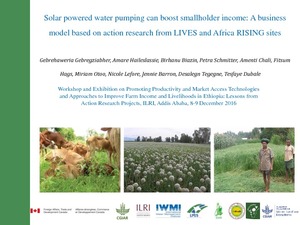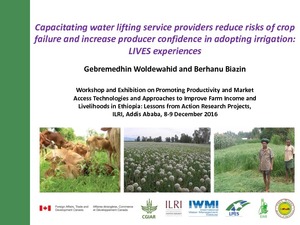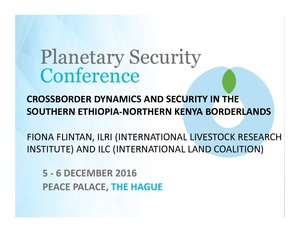Location
Vision, mission and strategy
ILRI's strategy 2013-2022 was approved in December 2012. It emerged from a wide processof consultation and engagement.
ILRI envisions... a world where all people have access to enough food and livelihood options to fulfil their potential.
ILRI’s mission is... to improve food and nutritional security and to reduce poverty in developing countries through research for efficient, safe and sustainable use of livestock—ensuring better lives through livestock.
ILRI’s three strategic objectives are:
- with partners, to develop, test, adapt and promote science-based practices that—being sustainable and scalable—achieve better lives through livestock.
- with partners,to provide compelling scientific evidence in ways that persuade decision-makers—from farms to boardrooms and parliaments—that smarter policies and bigger livestock investments can deliver significant socio-economic, health and environmental dividends to both poor nations and households.
- with partners,to increase capacity among ILRI’s key stakeholders to make better use of livestock science and investments for better lives through livestock.
This is ILRI’s second ten-year strategy. It incorporates a number of changes, many based on learning from the previous strategy (2000–2010, initially produced in 2000 and modified in 2002), an interim strategy (2011–2012) and an assessment of the external and internal environments in which the institute operates.
Members:
Resources
Displaying 121 - 125 of 1152Solar powered water pumping can boost smallholder income: A business model based on action research from LIVES and Africa RISING sites
Capacitating water lifting service providers reduce risks of crop failure and increase producer confidence in adopting irrigation: LIVES experiences
Crossborder dynamics and security in the southern Ethiopia-northern Kenya borderlands
Delivering insurance to protect livestock wealth and livelihoods in the drylands of Kenya
This filmed interview of Hassan Bashir, group chief executive of Takaful Africa Group, was prepared for the ILRI-World Bank Group side event at the Borlaug Dialogue, Des Moines, Iowa, 12 October 2016.
Pastoralism and Land-Tenure Change in Kenya: The Failure of Customary Institutions
Until recently, the Pokot in the highlands of the Baringo area in Kenya have practised semi-nomadic pastoralism. Today they are rapidly sedentarizing and in many areas suitable for farming, they are adopting rain-fed agriculture. As a result of these dynamics, claims to individual property on de facto communal rangelands have arisen, and to such an extent that they seriously threaten the peace of the community. This article explores the conflicts that emerge in the transition from common property to private tenure.






